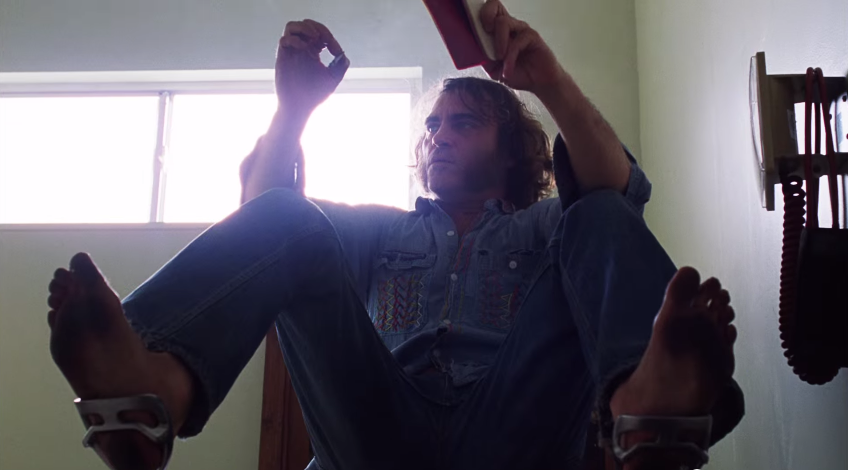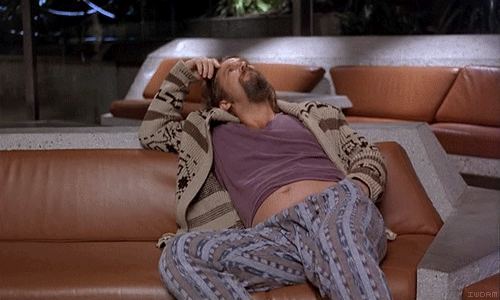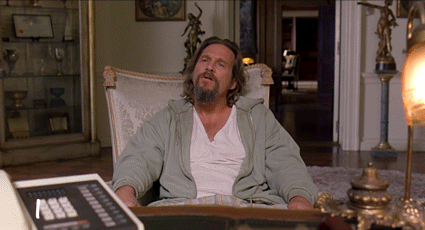
Pay attention to the dirty feet, hippie!
I saw Paul Thomas Anderson’s Inherent Vice (2014) last night. I enjoyed it. I just ordered Thomas Pynchon’s novel it was based on because I’m interested in how he adapted the original. I haven’t really been interested in Pynchon since undergrad. The Crying of Lot 49 is said to be one of his more accessible works, and it turned me off (not enough car chases and explosions 🙂 ). So the idea of struggling through works like Vineland, V., and Gravity’s Rainbow back in the 1990s wasn’t all that interesting to me. What’s more, I’ve been pretty tepid on Anderson’s work as well. I enjoyed Boogie Nights (1997) enough, but had no particular love for Magnolia (1999), hated Punch-Drunk Love (2002), couldn’t finish There Will Be Blood (2007) and found The Master (2012) moderately interesting, if a bit long and lacking tempo (something a number of his films suffer from in my opinion, including Inherent Vice).

But I come to Inherent Vice in a historical desert of good U.S. films, so I’m probably more forgiving than ever before. But beyond that, I’m co-teaching a noir-themed version of #ds106 this semester, so my interest in all kinds of noir is at a peak. And that’s part of what I liked about Inherent Vice, it was playing with all kinds of noir—drawing on neo-noirs like Robert Altman’s The Long Goodbye (1973), Roman Polanksi’s Chinatown and the Coen Brothers‘ The Big Lebowski (1997) as the canonical foundation of the genre, much more so than iconic classics like Double Indemnity (1944) and The Maltese Falcon (1941).

Does this make Inherent Vice somehow a neo-neo noir? You can see Larry “Doc” Sportello (Joaquin Phoenix) overtly channeling Jeff Bridges’ brilliant performance as the not-as-dirty hippie “The Dude” in The Big Lebowski. Sportello travels the same rehabs and 1970s L.A. haunts as Elliot Gould’s Marlowe in The Long Goodbye. He also investigates shady real estate deals, shadowy drug cartels, and the vertical integration of consumer dependence upon the monied elite, reminiscent of the untouchable corruption Jack Nicholson’s J.J. Gittes comes up against in Chinatown.

It doesn’t seem like you really need to go back to the older noir 40s and 50s noir. The focus of Anderson’s film—and I’m guessing Pynchon’s novel—on more recent noir suggests a kind of historical repositioning of the film genre. Paul Schrader’s “Notes on Noir” argues style is a more accurate definition of noir than genre, but in Inherent Vice the story is a historical container of the genre more broadly—working through so many of the tropes from which it derives meaning. It seems much more than a style in this regard. As Scott Leslie notes on Twitter earlier today:
@jimgroom yeah felt bad for people going to see it without a lot of background context, either film, literary or historical. Really needs it
— Scott Leslie (@sleslie) January 19, 2015
Inherent Vice provide an excellent reminder of just how much all narratives are intertextual, and constantly alluding, citing, and responding to one another. In many ways noir is a form of cultural literacy, and to understand noir over the last 90 years, is to learn about U.S. culture from within and without—it’s no coincidence the genre was most clearly articulated by a bunch of French cinephiles.
During the Depression in the U.S., a kind of cosmic fatalism seemed to have worked its way into the literature and film. You can see this in James M. Caine’s 1934 novella The Postman Always Rings Twice (which we’re reading this week in #noir106), as well as Billy Wilder’s Double Indemnity (1944), based on another of Caine’s classic noir novellas. Interestingly enough, Wilder was an Austrian Jew who emigrated to France and then the U.S. during the 1930s as Hitler came to power. His mother, grandmother, and step-father all died in the Holocaust. James Naremore, in his book More than Night, argues the “discovery” of film noir in post-war Paris is no coincidence. It was a city engulfed by the horror of World War II—a kind of existential ground-zero for Western Civilization. And many of the European emigres were the visionaries behind these Hollywood stories. From the very beginning noir was geopolitical.
That omnipresent fatalism in film noir turns its eye on new horrors in the later noir. Chinatown takes aim at power and capital, the 1930s water scandal it unearths provides an analog for the more contemporary corruption of Watergate and the Vietnam War. And by the time we get to the 1990s, the Iraq war is a media event, one which shapes how Lebowski understands his own world. He echoes Bush’s “this aggression will not stand”—which he watches while buying milk at Ralph’s grocery store—when he draws a line in the sand with the carpet pissers. The whole of Western Civilizations’ geo-political struggles (which we are still very much in the clutches of currently) are reduced to the lazy, ironic hero Jeff Lebowski who is truly “the man for his time and place.”

And this idea of a particular time and place through which noir continues to frame both the specificity of a moment, as well as the broader existential questions concerning our relationship to truth, power, and meaning is why I love it. This is why noir has increasingly become the preeminent genre for storytelling over the last eighty years. When it comes to dealing with the dark uncertainties where individuals and society interface, few genres do it better—as much as we love zombie films, they pale by comparison. In this regard Scott Leslie is right on, it takes some context to make sense of all this. Making noir the perfect frame for a #ds106 class. Why? Because #ds106 can’t simply be about learning particular technologies without a context, it must be about the context of technology in a particular time and place. In fact, technology is one of our darkest uncertainties as a culture right now: paranoia, surveillance, control, unilateral power, eroding rights, monied elite—need I go on? And originally I wanted this version of #ds106 to be about technoir, but that’s not enough. The net needs to be cast wider for the true creative capacity of a genre like noir to make sense.
Noir represents the spaces where individual agents (private investigators, detectives, and insurance agents) become at once representative of and estranged from institutional power over individual fate. By the time we get to Inherent Vice there seem to be no illusions that institutional corruption can be curbed. In fact, the LAPD detective, Big Foot (played brilliantly by Josh Brolin), has become paralyzed by the corruption of the institutional structure he works within. Whereas noir detectives and PIs were traditionally the human face of, and moral compass of institutions—in Inherent Vice they’ve become caricatures—militarized and extreme—with none of the complexity of James Ellroy’s boys in blue.
It’s as if the advice given to J.J. Gittes at the end of Chinatown has become noir gospel, “Forget it Jack, it’s Chinatown,” there’s not a damned thing you can do about it. But, in Inherent Vice, maybe you can do one small thing. Like salvage a relationship; rekindle a love affair. Sow some unassuming seeds of hope and compassion in a world gone awry. As noir it’s extremely modest in its aspirations—and that’s a sign of our times when it comes to power, money, and the like. We live in times where we waged global war for oil, we know the NSA is spying on us, we know the distribution of wealth is unjust, we known our politicians are lying to us. We know all this, and we don’t seem particularly concerned. It’s a distressing time for just that. And Inherent Vice provides no solutions. In fact, now that I think about it, it returns us to some of the more fatalistic noir of the 1930s and 40s. This is nowhere more apparent the when Sauncho Smilax (Benicio Del Toro) defines the title of the film in legal terms. Inherent vice is…
the tendency in physical objects to deteriorate because of the fundamental instability of the components of which they are made, as opposed to deterioration caused by external forces. All objects have some kind of inherent vice as a result of the baseline law of entropy.
So rather than a looking out to struggle with the external forces which characterize noirs like Chinatown, The Long Goodbye, and The Big Lebowski, this film is a turning inwards. A solipsism that obsessed with the fragile, unstable things we all are within this fatalistic cosmos of deep uncertainty. I guess this would explain all the gym subscriptions, yoga pants, and zealous faith. At the same time, in the face of the instability of the cosmos one small thing is accomplished by filthy-footed protagonist. A family is saved. A relationship is tenuous, but possible. In many ways it’s a film that embraces the macro-fatalism of noir and challenges it with a few moments of micro-hope 🙂 By no means a great noir, but when taken within the broader context of the genre it gives you some things to consider. Noir, it’s #4life


Nice write up Jim, I was pleased to hear you were going to see it as I knew (even without the background in Pynchon’s works themselves) you’d appreciate the film. Totally agree about the pacing, I like PT Anderson’s films but each of them always seem like they’re 10-15 minutes too long (which is a terrible thing to say, I know, but…)
I think the parallels with Lebowski are huge; not only is this film, like it, very specifically set in particular time (in this case 1970- the death of the 60’s, Cointelpro, Manson, Altamont, etc) but it uses comedy within a dark genre like Noir because, well, what the hell else can you do but laugh at the f*@$ing absurdity of it all. And yes, he brings a family back together, but like the last line says, “don’t think this means we’re getting back together.” Things fall apart, the centre cannot hold, but hey man, let’s roll another number for the road.
I must love you a lot because I forgive you for not liking The Crying of Lot 49, possibly one of my favourite books ever. The definition you dug up for the term “inherent vice” is perfect, entropy (and how it bridges information theory and physics, cf Maxwell’s Demon) is a longtime theme of Pynchon. Give him another chance, there’s a lot of there there.
“There is no way out. Lie and wait, lie still and be quiet. Screaming holds across the sky. When it comes, will it come in darkness, or will it bring its own light? Will the light come before or after?”
Scott,
I miss your thoughtful commentary on the bava, there is a long history of it. And I know I am feeling good again when we are talking about film, literature, and theory on the bava 🙂 Welcome back. I have been wrong all too many times before, so I will definitely revisit Pynchon. As it turns out Inherent Vice arrived this morning, so I’ll start there and then jump to The Crying of Lot 49 again. I’ll let you know if I was wrong 🙂
One thing you mention that reminds me of a whole other strand on this blog a couple of years ago is the end of 60 marked by various moments, including Manson. In a True Crime course I taught with Paul Bond in Fall of 2013, we actually watched the 1976 TV movie Helter Skelter. And that is some hardcore hippie hating, not unlike Big Foot. In fact, Manson is mentioned a few times in Inherent Vice, and I couldn’t help but think about this bit from Mike Caulfield’s comment on the Helter Skleter post I wrote, which in many ways is the sequel to this post, although I didn’t know it while writing it:
And these narratives, mostly playing our before our time or when we were toddlers, is still the cutlrual hangover we are operating under. The metaphorical haze we exist within, and 9/11 wasn’t enough to shake it, as Caulfield notes in the rest of his lead conspiracy dissertation 🙂 And it’s funny that if we are entering a new moment with Big Lebowski and Inherent Vice, the ironic, absurdist noir you suggest, which is right on, we may be exploring a space beyond these historical tropes we have existed within for 40+ years. None greater than the dirty hippie.
Hippies are the peak of hopeful ideaslism and the nadir of the seemingly inevitable sell-out. One of the things that most depressed me about the #occupy movement on Wall Street in the Fall of 2012 was the it somehow got hijacked by the hippie aesthetic and sensibility. That shit is done, played, over, finished. In this I totally agree with Big Foot.
But, to be fair, the hippie is such a powerful, ongoing cultural icon because it seemed to promise something else. The punk was pissed and anarchic, but there was no longterm plan of flowery communes and freelove (probably more honest than the hippies in that, but not a salable narrative anyway). The hippies provided the narrative we have been trying to awake from to move on. They won’t die, hopefully dirty hippie noir is the way out we need 🙂
The movie, like the book, is brilliant. You should probably re-read Crying of Lot 49. Pick up Bleeding Edge, too, as it’s also terrific.
Hippie.
ZD
Big fan, Zach. You made me, even if you did lose all your NYC grit.
+1 on Zach’s recommendation of Bleeding Edge, his other most accessible work I think.
Jim’s hippie bullshit aside, I gotta go on record and say that Inherent Vice was probably my favorite read in the last 3 or 4 years. The only book, I think, since grad school that made me feel like I could give two shits about capitol-L literature again. I loved Crying of Lot 49 as an undergrad, but have put down most other Pynchon novels since then, so I’m not much of a fan boy. Although, I kinda wish I were, because I think a strong appreciation of Pynchon is indicative of intellectual and spiritual grit.
Anyhow, I read Inherent Vice twice, and listened to the audiobook a few times as well–great narration. I love it more each time, and often turn to it when life feels, you know, too far out to take.
The Bleeding Edge audiobook is also painfully great–narrated, I think, by the woman who plays Doc Sportello’s aunt in the film. She has this intense New York Old school Jewish accent that’s, well, immersive.
I don’t know why you’re hating on P.T. Anderson, Jim, but I think the book and movie are worth a second look.
Lotsa love,
Your friend,
Zach
I properly loved Magnolia – I just want that up there on the record.
& I’m still looking forward to Inherent Vice.